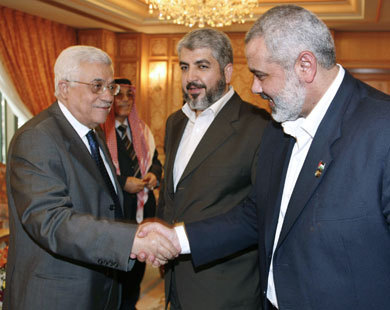
The meeting ended with both sides also agreeing to work for the release of political prisoners of both movements in Gaza and the West Bank, and to solve the issue of passports for Gaza residents by the end of Ramadan, Hamas spokesman Sami Abu Zahri said in Gaza.
The agreement "is important because it is a reassuring message to the Palestinian people, and it reflects the seriousness of both parties in implementing it," he added.
A committee would also be formed to "ensure the opening of closed institutions in both the West Bank and Gaza," Zahri said.
The two sides held consultations late on Saturday in the presence of Egyptian intelligence officials, MENA said, adding that Fatah's delegation was led by Azzam al-Ahmed and Hamas by Musa Abu Marzuq.
Before the talks, Fatah official Sakhr Bssisso said they would focus on "mechanisms of implementing the reconciliation deal" in all its aspects, including forming a new government, one of the main hurdles delaying the deal.
Zahri told AFP on Saturday that his group was "serious in wanting to implement the agreement as soon as possible."
But he added that there were some hurdles, namely Fatah's insistence on keeping Salam Fayyad as prime minister.
Meanwhile, Palestinian president Mahmud Abbas reiterated his call for a government of independents, following talks in Amman with Jordan's King Abdullah II.
"We have said more than once the Palestinian government that we want to form is not a national unity or coalition government," Abbas was quoted as saying by Jordan's state-run news agency Petra.
"We seek a government of independents, transitional government," said Abbas, who discussed Palestinian reconciliation with the king, the agency said.
In early May, Fatah and Hamas signed a unity deal in Cairo and have met twice since to discuss the formation of an interim government.
However, follow-up talks between Abbas and Hamas chief Khaled Meshaal have been put on hold.
The talks reportedly stalled over disagreement about which side should get the post of prime minister. Abbas and his Fatah movement want to keep Fayyad on as premier, despite strong objections from Hamas.
Fatah has officially announced its support for Fayyad as prime minister of a government composed of independents, which must organise elections by May 2012, but Hamas has rejected his candidacy, saying it wants somebody from Gaza.
--------------------------------------------------------------------------------------
The agreement "is important because it is a reassuring message to the Palestinian people, and it reflects the seriousness of both parties in implementing it," he added.
A committee would also be formed to "ensure the opening of closed institutions in both the West Bank and Gaza," Zahri said.
The two sides held consultations late on Saturday in the presence of Egyptian intelligence officials, MENA said, adding that Fatah's delegation was led by Azzam al-Ahmed and Hamas by Musa Abu Marzuq.
Before the talks, Fatah official Sakhr Bssisso said they would focus on "mechanisms of implementing the reconciliation deal" in all its aspects, including forming a new government, one of the main hurdles delaying the deal.
Zahri told AFP on Saturday that his group was "serious in wanting to implement the agreement as soon as possible."
But he added that there were some hurdles, namely Fatah's insistence on keeping Salam Fayyad as prime minister.
Meanwhile, Palestinian president Mahmud Abbas reiterated his call for a government of independents, following talks in Amman with Jordan's King Abdullah II.
"We have said more than once the Palestinian government that we want to form is not a national unity or coalition government," Abbas was quoted as saying by Jordan's state-run news agency Petra.
"We seek a government of independents, transitional government," said Abbas, who discussed Palestinian reconciliation with the king, the agency said.
In early May, Fatah and Hamas signed a unity deal in Cairo and have met twice since to discuss the formation of an interim government.
However, follow-up talks between Abbas and Hamas chief Khaled Meshaal have been put on hold.
The talks reportedly stalled over disagreement about which side should get the post of prime minister. Abbas and his Fatah movement want to keep Fayyad on as premier, despite strong objections from Hamas.
Fatah has officially announced its support for Fayyad as prime minister of a government composed of independents, which must organise elections by May 2012, but Hamas has rejected his candidacy, saying it wants somebody from Gaza.
--------------------------------------------------------------------------------------









 Home
Home Politics
Politics









